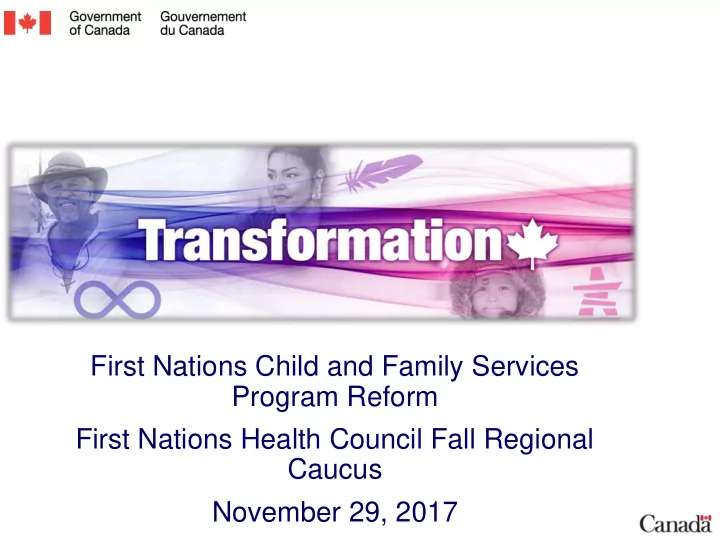

First Nations Child and Family Services Program Reform First Nations Health Council Fall Regional Caucus November 29, 2017
Overview • Transformation of Indigenous and Northern Affairs Canada • Updates from our national and regional engagement • Community initiatives • Summary of what we’ve heard through spring regional caucuses • Next steps in reform • Canada- BC discussion questions 2
Two new departments created – Crown-Indigenous Relations and Northern Affairs, which will advance reconciliation objectives and will lead on The Honourable Carolyn Bennett, Minister of northern programming and Crown-Indigenous Relations and Northern Arctic policy Affairs – Indigenous Services, which is charged with improving the delivery of programs and services and closing socio- economic gaps – Prime Minister’s mandate letters to the Ministers The Honourable Jane Philpott, Minister of https://pm.gc.ca/eng/mandate- Indigenous Services letters 3
National Engagement Update • Canadian Human Rights Tribunal – update on Canada’s continued implementation with partners – Jordan’s Principle: Between April 1 and September 30, 2017, there were an estimated 19,713 products/services approved. The Jordan’s Principle Action Table continues work to develop long-term policy options for 2019 and beyond. – Agency funding increased – Formula work with Nishnawbe Aski-Nation on Remoteness • Canada’s work with the National Advisory Committee : – A number of action tables are exploring specific issues – Table on funding for delegated agencies is reviewing agency needs assessments; and is currently surveying agencies on salaries – Other tables are discussing community best practices and exploring new jurisdictional models and legislation • Tripartite table development and collaboration across the country 4
Update on Engagement in British Columbia • BC Tripartite First Nations Children and Families Working Group – Reconciliation Charter – Ed John Report’s 85 recommendations – Draft Action Framework – Workplan development- Canada will bring input from FNHC regional engagement caucuses • First Nations Health Council Regional Caucuses: – Building upon what was heard during spring caucuses – Working on engagement pathway set with the FNHC • Indigenous Rights Recognition and Self-Determination negotiations • Exploring government funding mechanisms to – Understand funding processes in partnership with BC and First Nations for Child and Family Services – To maximize funding and funding flexibility for community well-being 5
Current Community Initiatives Group carrying out the initiative Community Initiative Esk’etemec Pilot social worker to address root causes of child removal Kw’umet Lelum Step Up program to support youth transitioning out of care Federation of BC Youth in Care Support for youth aging out of care through cultural connections Nuu-chah-nulth Tribal Council Strengthen cultural competencies Upper Nicola Family preservation and prevention programming Stikine Wholistic Wellness Group (northern remote) Okanagan Nation Alliance For part of implementation of mental wellness framework, including wrap-around services Wet’suwet’en Working Group Develop and implement a holistic Wet’suwet’en child welfare services (based on ANABIP) model and transfer of child and family services jurisdiction to the Wet’suwet’en Nation. Carrier Sekani Family Services (CSFS) CSFS Child and Family Services prevention and governance framework. Secwepemc Nation Tribal Council Explore the potential for federal and provincial enabling legislation to support jurisdiction over child and family services at the Secwepemc Nation level 6
Summary of what we heard from regional spring caucuses Engage directly with communities through a Nation-to- Nation approach Direct, coordinated, and flexible prevention funding approach that enable community development Develop family wellness plans and invest in healing that is focused on prevention – not apprehension Support for families going through the Justice system and help address generations of trauma Take a cross-departmental or governmental approach to break program silos 7
Next steps: • Work with partners to continue to address Tribunal Orders • Continue engagement, including tripartite/technical tables and Indigenous regional engagement by: – Collaborating with British Columbia First Nations’ leadership and the Province of British Columbia on child and family services reform; – Learning from various activities including the completion of the First Nations Child and Family Services Delegated Aboriginal Agencies distinct needs assessment and supporting cultural programming development; – Supporting community initiatives about new ways and best practices for protection and prevention services; and – Working with the National Advisory Committee as we continue to meet and gather additional information to reform the Program 8
Discussion Questions from Canada and British Columbia 1. What does community-based prevention programming look like? a) How would you use community-based resources to support family wellness? b) What are the challenges for developing and funding these resources? (i.e., remoteness, staff retention, alignment with CFS agency programs)? c) How would you define & measure successes of this prevention work? 2. How do we support coordination of community level services? And, what kind of opportunities could there be to build on other sources of funding? In what areas would you like to see closer collaboration between your community, MCFD and Canada? 3. If capacity to develop community-based resources is a concern for you, which are the areas where you could most use extra support from government? 9
Recommend
More recommend